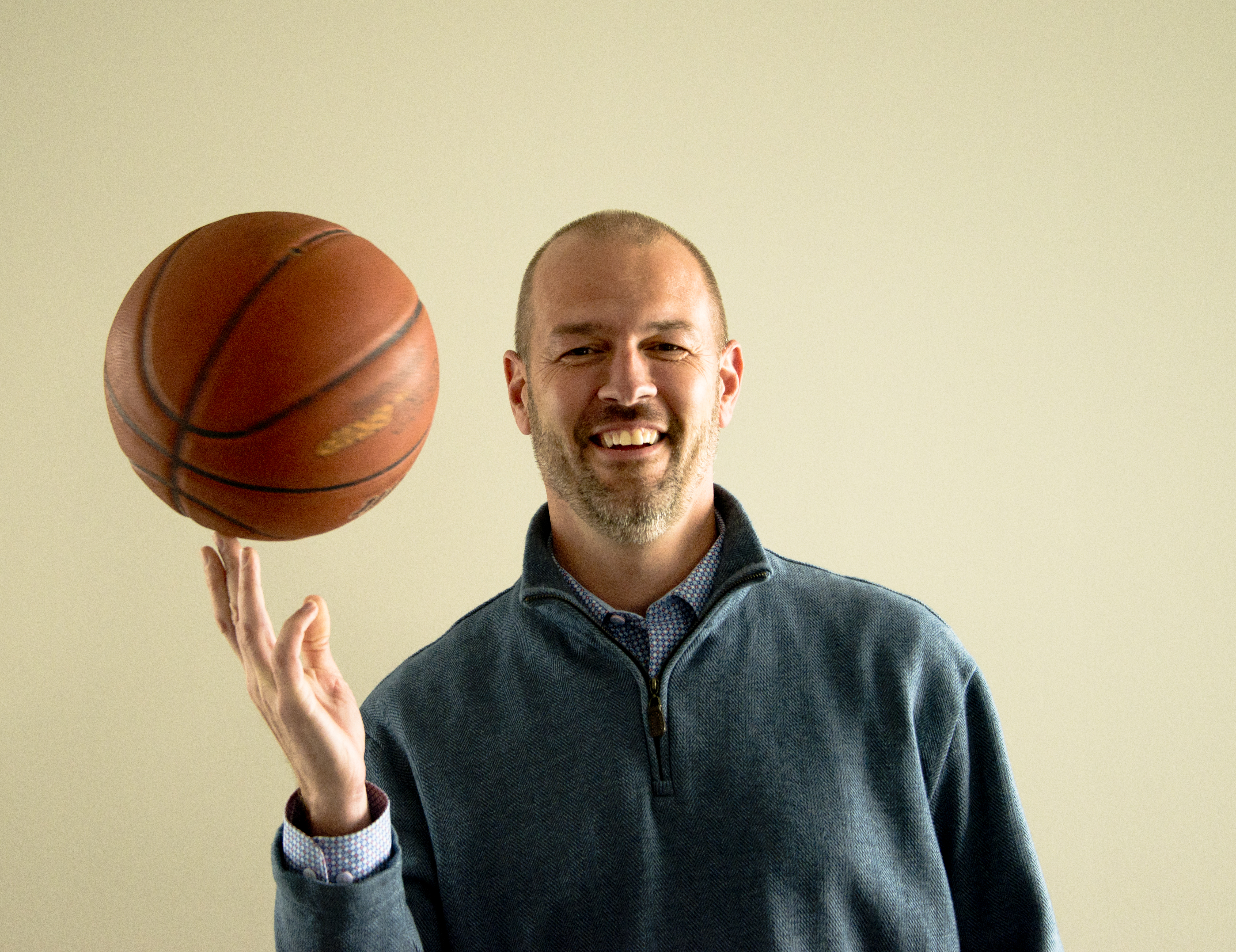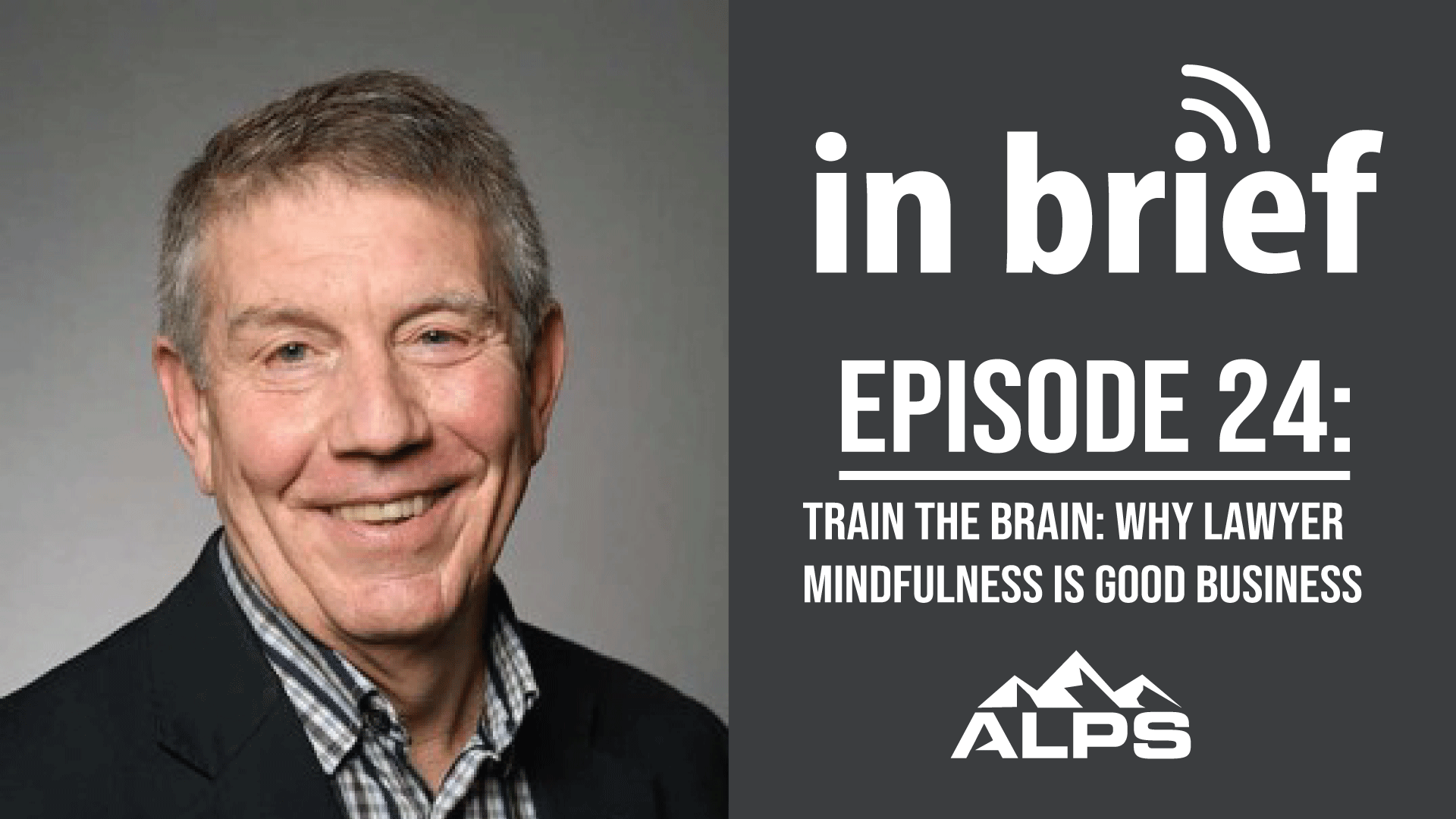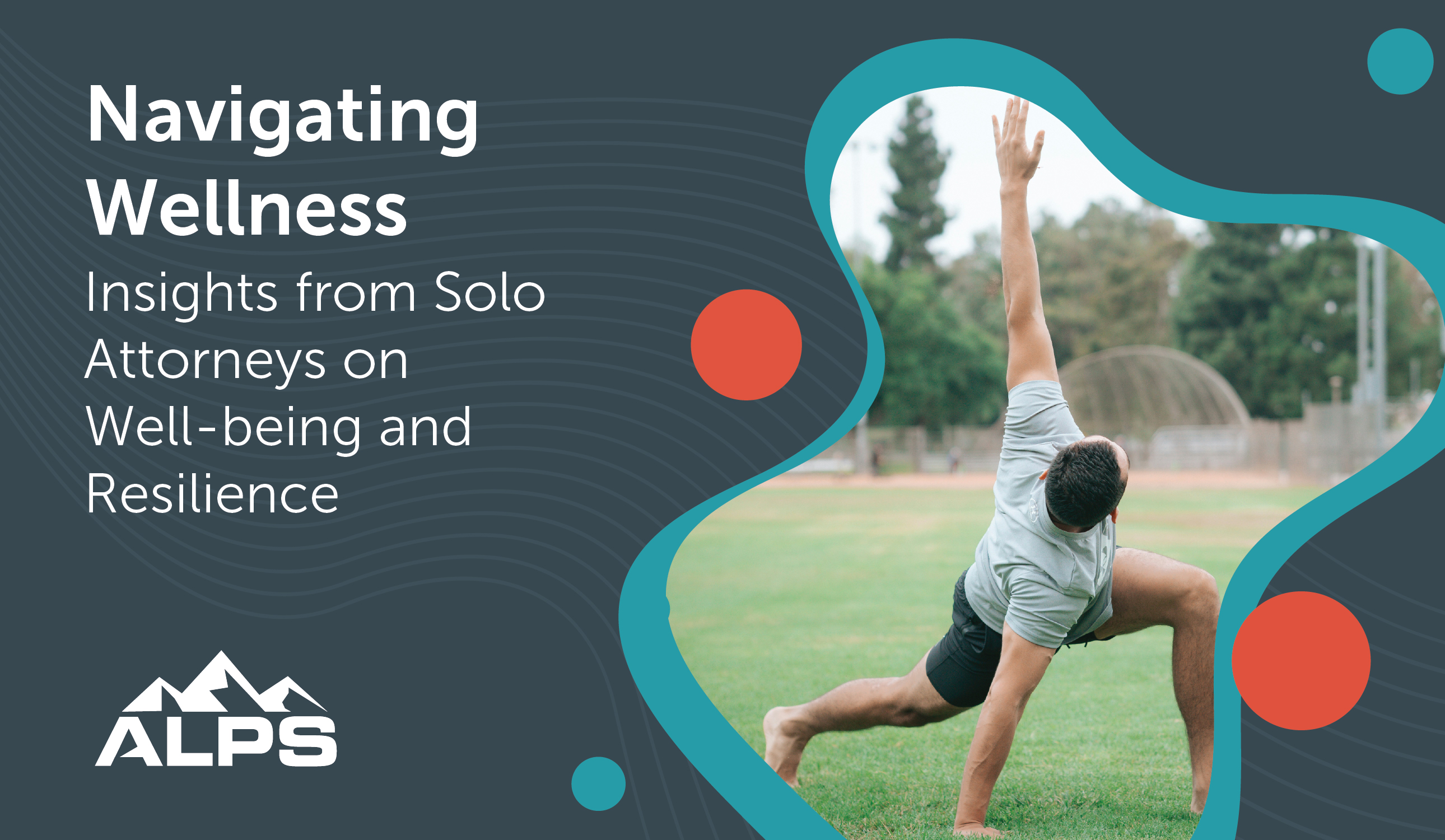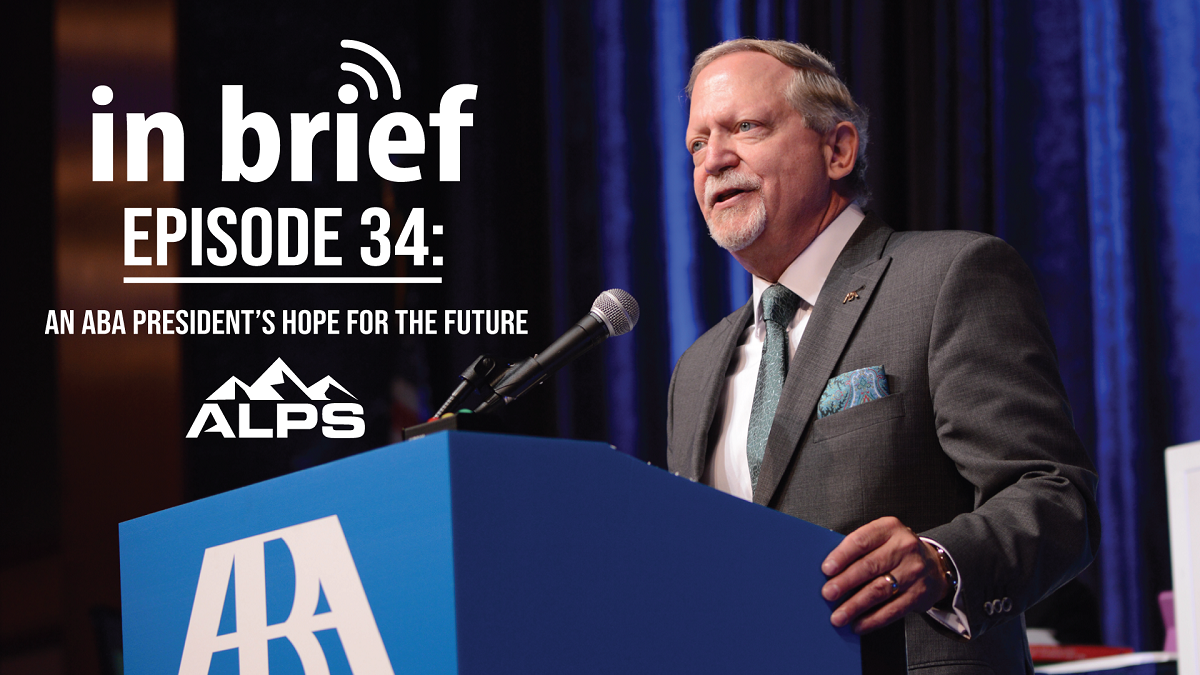15 min read
ALPS In Brief – Episode 37: Don't Mind Your Own Business
How can we make real changes within the practice of law to lessen the impact of stress on individuals in this profession? In this episode of the...
We've crafted solutions tailored to your firm
The world of insurance for law firms can be confusing, and difficult to navigate. We've created this glossary because these common insurance terms should be easy to understand.
10 min read
 Chris Newbold, Chief Operating Officer
:
Updated on February 28, 2024 | Posted on October 18, 2018
Chris Newbold, Chief Operating Officer
:
Updated on February 28, 2024 | Posted on October 18, 2018

Jeff Bunn, lawyer, wellness expert and owner of the Mindful Law Coaching and Consulting Group, presents the business case for investing in attorney wellness. As he sits down with ALPS Executive Vice President, Chris Newbold, Jeff lays out why making mindfulness a priority in the legal profession makes sense not just from the health standpoint, but also the economics of the practice of law. To learn more about all areas of attorney wellness, visit the National Task Force on Lawyer Well-Being’s Resource Page, featuring the report and more information on what is happening in your state.
ALPS In Brief, The ALPS Risk Management Podcast, is usually hosted by ALPS Risk Manager, Mark Bassingthwaighte. This episode is hosted by Chris Newbold, ALPS Executive Vice President.
Transcript:
CHRIS:
All right. Welcome. This is Chris Newbold. Welcome to another version of the ALPS podcast ALPS in Brief. I’m sitting here in downtown Chicago with one of the experts in the field of wellness, Jeff Bunn, who is the owner of the Mindful Law Coaching and Consulting Group. Had a chance to meet Jeff a few weeks ago and he’s doing some wonderful work in the field.
Today we’re going to talk about the business case for wellness and why that makes good sense for firms, law firms, and the legal profession in general. Maybe what we’ll do is start, Jeff, by just having you just introduce yourself and what gives you an interest in this particular area. I know you’ve had a distinguished legal career as well. Maybe just a little context on who you are.
JEFF:
Absolutely. I’d be happy. Thanks very much for inviting me, Chris. It’s a delight to speak with you. My focus is really mindfulness, which is a little piece of the wellness pie, if you will. I happen to think it’s a great and very important issue. It’s an issue that gets a lot of play, a lot of thought, a lot of curiosity.
My story very briefly, I started … I used to be like your Type A trial guy, long distance running. I was walking the dog one day, slipped on some black ice, got my knee scoped, and long story short couldn’t run anymore. I was looking for something that was a low impact, no impact alternative to running. Little did I realize that I used to go out … When I talk about running I’m talking about an hour or two hours kind of thing. It was meditation for me.
What I got into, because of my injury, was yoga. A lot of the men and women that I met practicing yoga talk about not only the poses and the practice but also other things that are more spiritual. I just found that that kind of resonated for me.
I took a training session, a meditation training session that is, and I just got into it. Now I’m not a proselytizer. I’m not out there banging the drum for being a spiritual guru. Quite to the contrary, I think that there are a lot of aspects of mindfulness, which is a piece of a larger tradition, like the Buddhist tradition in particular, that I think can be … It’s not an all or nothing proposition as a lot of people, men and women who I respect, feel a great deal of affection for and know. They’re kind of an all or nothing … You’re either all in or you’re not.
I get that. I understand it but I do believe that it doesn’t have to be all or nothing. There are aspects of that faith or spiritual practice, Buddhism, mindfulness in particular, that can have a business application.
My saying is, which I ripped off from Dan Harris who is a great guy, is a news anchor that you or some of your listeners may know of, also the author of a great book, 10% Happier. It’s an old book now. He’s written more recently. It’s about mindfulness and how it changed him.
Dan came up with a description of what is mindfulness? Well, if you ask 50 different people you’re going to get 50 different definitions. He came up with a great soundbite that just works for me, “Simple, secular, scientific”.
That’s really what it is. To me, it’s brain training. Mindfulness, that aspect of a broader practice, can be segmented, can be applied to the business world in terms of helping us focus our attention, prioritize our distractions, and the like.
CHRIS:
That’s the key to it then is the ability? I mean, obviously we know that most lawyers in practice are go, go, go, busy, busy, busy, right?
JEFF:
Yup. Yup.
CHRIS:
The value proposition of mindfulness comes in where?
JEFF:
I think in terms of being able to again focus our attention and then prioritize distractions. There are distractions like emails, telephone calls, partners hanging out with a cup of coffee in the doorway wanting to talk about whatever. Yet we have a filing that we have to get done by such and such a time. Or we have a meeting coming up in 20 minutes and we need to think about that. Or a phone call or what have you.
I think that there are a lot of … I think of it in terms of physical fitness and mental fitness. Everybody gets the idea of physical fitness now. As employee benefits go it’s not a stretch at all to have firms or businesses help their employees deal with the … They’ll make contributions towards their monthly gym dues or what have you.
Well, let’s start taking care of our minds as well as our bodies. I think if you think of mindfulness as not just vague woo woo kind of thing but actually very specific brain training. Attention, prioritizing distractions …
The distractions will come but if one learns to focus one’s attention in the midst of all the distractions that come that’s going to make you a better lawyer. It’ll make you a better professional. Therefore, I think it has … Those practices, while it might not seem obvious, have an application in the business world.
CHRIS:
Yeah. We had a chance to be on a panel a couple of weeks ago. I think you’ve been able to crystallize as succinctly as I’ve been able to hear it about just the value of mindfulness and the value that it can bring … If I’m a senior partner at a law firm build the case for me for why this is a good path to pursue. Often times we hear wellness and we think, “Oh, somebody is taking a two hour lunch,” which for a lot of senior partners means that’s less billable hours, right?
JEFF:
Yeah.
CHRIS:
It’s a little bit of a … I think you’ve been able to turn it on its head a little bit and say, “There are some real definitive business case elements to thinking about wellness, thinking about mindfulness.” I’d love for you to present that for our audience.
JEFF:
Sure. I’d be happy to do that. It really has been a part of my journey. If I was having a conversation with you and you’d ask me, “What is mindfulness?” I’d start talking to you about what mindfulness is but in your mind you could just see people’s eyes glaze over. They’re just thinking it’s all woo woo and, “Oh, Jeff has lost it. He’s gone around the bend.”
I get that. It was very frustrating at first because I felt like I was banging my head against the wall trying to convince people of something that they were disinclined to believe.
Then I started thinking, you know, if you can change the conversation … Don’t talk about something that whoever you’re speaking to may think of as woo woo, as something vague and ill-defined with a lot of negative connotations. Let’s talk about things that we do understand that have real meaning for us.
That’s how I started thinking about is there such a thing as a business case for mindfulness. I think there is. As I’ve thought about it I’ve come up with … There are five areas that I touched upon that I alluded to when you and I last met … I’m sure there are more. It just requires more thought.
Just knocking them off and here I’m going to call myself out here, I better remember this, recruiting, retention, insurance costs, CLE costs, and basically productivity, which kind of ties all those together.
I think in terms of business, hard dollars, the idea of recruiting younger men and women. How does one law firm stand out from the crowd? How does one distinguish one’s self? If a recruiter is able to say, “We value the minds of the men and women who work for us, old and young, and we put our money where our mouth is” that’s going to help you tell a story that’s going to hopefully help you recruit the best and the brightest to your firm.
CHRIS:
Particularly with this generation, right?
JEFF:
Absolutely.
CHRIS:
One that’s I think coming into the legal profession with a sense of, “Obviously I want to do incredible work as a new lawyer but I also want to maintain a better work/life balance.”
JEFF:
Yeah. Yeah. Absolutely. I have said and I still maintain that a law firm’s greatest asset is its lawyer’s minds. If you can begin to make a case, a real case, not just lip service, but a real case that we value our lawyer’s minds, we want to protect them and the way we protect them is help them be happier, help them live a life that’s more fulfilling, then that’s a good thing for them and it’s good for us as well, which really gets to the idea of retention.
If men and women who are at a law firm five, six, seven years out instead of saying, “I’m going to go in-house. I’m going to go do something else. I’m going to do this, I’m going to do that, but I’m done doing this, the law firm thing.” Well, what a cost. The cost to the law firm of replacing the talent is huge.
CHRIS:
Huge.
JEFF:
It’s huge. Hundreds of thousands of dollars. You lose in terms of continuity, of service to clients. You lose potentially the business of some clients. There’s just nothing good I would submit that accrues to a law firm by virtue of a departure of a seasoned professional. I think it behooves a law firm to do what it can to help keep the men and women it has been developing. Recruiting is a big issue but retention I think is a huge issue.
I think also insurance costs and kudos to ALPS for recognizing that. I think that both in the area of health costs and perhaps professional liability costs it can be having a real committed, defined program can help deal with both health costs and professional liability costs.
Very quickly on the health thing. One might question, “How does taking care of your mind translate into benefits that can accrue to you physically? To your body?”
What I mentioned in the talk that you and I participated in recently was a Wall Street Journal article that was two or three weeks ago. Maybe a month at best. That was talking about mindfulness app developers that have begun the process of applying through the FDA for approval of some of their apps as medical devices.
Because, now we get into the science that I won’t bore you or your listeners with now, the science behind all of this … If you go to Aetna is a big company that has embraced mindfulness. If you have any interest at all go to their website. Aetna’s got a great …
CHRIS:
Scientific studies are clearly there now.
JEFF:
Big time. Big time. On the subject of science too I’m a little bit off-topic here but I’ll go there, the idea of neuroplasticity. Relevance for younger men and women in terms of recruiting and retention that’s I think something that firms need to pay attention to but what about their older people? People like me?
CHRIS:
Yeah.
JEFF:
Why would I care? Well, forget about me but just as an example as a human being who is 65 years old, neuroplasticity, which has driven a lot of the science and a lot of studies, is really the answer.
The concept behind neuroplasticity is that regardless of one’s age, it’s not just babies, it can be 65 year old people, we can rewire our brains. We can learn new things. The brain is a live, malleable, plastic thing. There are good reasons why even older people can and should engage in mindfulness because it relates to neuroplasticity and the ability to learn. Again, back to …
CHRIS:
CLE and then productivity.
JEFF:
Right. Now we’ve got CLE and productivity. CLE, a lot of states have started … Well, there are at least a handful, maybe 10, states now that have adopted ABA standards. The ABA did a great service to our profession by appointing the National Task Force on Wellbeing, which authored a report. It’s a lengthy report, as you know very well. 70-ish pages including the appendices. It’s a great read, by the way. I heartily commend it to anybody who is interested in the topic.
Apropos of that task force findings there have been recent changes recommended, not yet adopted by all states but it’s just a matter of time, it will be, that include among CLE a requirement that men and women in the legal profession study programs that are either mental health, substance abuse, diversity and inclusion.
I would suggest to you that I think in terms of … Those are costs that are typically borne by a law firm that instituting a program will help a firm qualify and train their people in that area.
All of which gets to the issue of productivity, which just makes people who are happier and are better balanced work better. Not longer. The billable hour is still with us. There’s going to be plenty of emphasis placed on that by the business people but allowing and putting into place programs that help our men and women work better as opposed to longer …
CHRIS:
There’s no doubt that to be a good lawyer one has to be a healthy lawyer, right? The more that we encourage those types of cultures I think the more that we’re going to see the economic return of that.
JEFF:
Absolutely. Just in conclusion, it occurs to me … I think I mentioned this too earlier that I think the airlines really get it right when we all fly for business or pleasure and part of the opening instructions are always, “If in the unlikely event of a water landing or whatever take care of yourself first. Put your mask on first and then take care of other people.”
CHRIS:
Yeah.
JEFF:
Same concept applies to lawyers. If we learn to take care of ourselves, physically and mentally, we’ll do a better job for our clients.
CHRIS:
Awesome. Well, Jeff, if people want to get a hold of you and want to talk a little bit more about the mindfulness or the wellness things that you are working on how can they reach you?
JEFF:
Love to do that. Thank you for asking. Probably the best way is to deal with my email address. Right now it’s J Bunn Law, J B-U-N-N, Law at Gmail dot com. Just bang me out an email. Whatever is on your mind. I obviously like to talk about this stuff. I’d be delighted to do just that.
CHRIS:
Good. Well, thank you, Jeff. Thank you listeners. Again, if you have any topics of interest that you’d like us to focus on an upcoming podcast please let us know. Thank you.
JEFF:
Chris, thanks. Okay.
 Jeffrey H. Bunn is a retired litigation attorney, who practiced in both State and Federal courts for nearly 40 years, and was previously member of a three-person Management Committee for a Chicago law firm. “I’m one of us. I’ve represented many different clients in a variety of civil matters, was a former ethics partner and have managed (and been managed by) others. I understand how lawyers and law firms operate. I also understand business and business people. And I’m a regular meditator, trained in the vipassana tradition”.
Jeffrey H. Bunn is a retired litigation attorney, who practiced in both State and Federal courts for nearly 40 years, and was previously member of a three-person Management Committee for a Chicago law firm. “I’m one of us. I’ve represented many different clients in a variety of civil matters, was a former ethics partner and have managed (and been managed by) others. I understand how lawyers and law firms operate. I also understand business and business people. And I’m a regular meditator, trained in the vipassana tradition”.
Jeff was prior chair of the Chicago Bar Association (“CBA”) Commercial Litigation committee, and more recently, the founder and chair of the CBA committee on Mindfulness and the Law.
Jeff was the initial vice-chair of the Lawyers’ Assistance Program (“LAP”) Illinois Task Force for Lawyer Well-Being (modeled after the National Task Force that was formed by the American Bar Association (“ABA”), which issued a written Report in late 2017). He has led guided meditation sessions for the American Association of Law Schools (“AALS”), and the State Bar of Nevada. In addition, Jeff has presented on matters concerning the incorporation of mindfulness and meditation into the practice of law for the CBA, Chicago Volunteer Legal Services (“CVLS”) and the National Association of Bar Executives (“NABE”), as well as other professional organizations.
Jeff was previous blogger-in-chief of the, “The Mindful Law Guy” blog, and has written a book (Canary In The Coalmine) that is submitted for publication, as well as a screenplay (The Meditation Hesitation Blues), that has been submitted for sale and production.
ALPS In Brief Podcast Intro/Outro Music: Walk In The Park by Audionautix is licensed under a Creative Commons Attribution 4.0 license. https://creativecommons.org/licenses/by/4.0/
Artist: http://audionautix.com/
Chris L. Newbold is Executive Vice President of ALPS Corporation and ALPS Property & Casualty Insurance Company, positions he has held since 2007. As Executive Vice President, Chris oversees ALPS business development team, sales strategy and served as ALPS’ chief liaison into the bar association community until 2023. Externally within legal circles, Chris is a recognized nationally based on his roles as a strategic planning facilitator to bar associations and bar foundations, his leadership work in the lawyer well-being movement and his work advising states regulators and / or bar associations exploring the merits of implementing mandatory malpractice insurance requirements or stricter client disclosure rules. On the strategic planning front, Chris’ lawyer credentials, knowledge of legal industry trends and keen observations into bar association relevance catapulted him into desired facilitator in legal conversations nationally. Chris' unique and innovative strategic planning approach have resulted in his leading retreats and legal conversations at the national, state and local levels, including with State Bars in Maine, Vermont, Virginia, Kansas, South Dakota, North Dakota, Montana, Idaho, Wyoming, Nevada, the U.S. Virgin Islands, as well as the National Conference of Women’s Bar Associations. On the issue of lawyer well-being, Chris has been at the epicenter of discussion both strategically and as an advocate. As co-author of the movement launching 2016 report The Path to Lawyer Well-Being: Practical Recommendations for Positive Change, his leadership as co-chair of the National Task Force on Lawyer Well-Being, his participation on the ABA’s Working Group to Advance Well-Being in the Legal Profession, his role as co-host The Path to Well-Being in Law podcast, and his time as President of The Institute of Well-Being in Law Chris has been at the forefront of a movement intent on creating a culture shift in the legal profession, and advancing personal and professional satisfaction in all sectors of legal life. Chris has also been active nationally counseling State bar associations and regulators on the viability of requiring lawyers to maintain malpractice insurance as a condition of licensure. Given Chris’ insurance industry knowledge, particularly within small firms and solo practitioners, his insights have been additive to the conversations in states like Nevada, Washington, California and Idaho. Chris is also well versed in alternatives to mandatory insurance like client disclosure rules. Chris received his law degree from the University of Montana School of Law in 2001 and holds a bachelor’s degree from the University of Wisconsin-Madison (1994). Following his graduation from law school, he served one year as a law clerk for the Honorable Terry N. Trieweiler of the Montana Supreme Court. After his clerkship, he launched his ALPS career as President and principal consultant of ALPS Foundation Services, a non-profit fundraising and philanthropic management consulting firm. In that capacity, he authored The Complete Guide to Bar Foundations in conjunction with the National Conference of Bar Foundations. Outside of the law, Chris is currently chair of the board of directors of the University of Montana Alumni Association, has authored two children’s book about collegiate mascots (The Big Bucky Badger Mystery (Wisconsin) and The Wild Wolf Pack Mystery (Nevada)) and enjoys his Montana lifestyle with his wife, Jennifer, and their three children, Cameron, Mallory and Lauren.

15 min read
How can we make real changes within the practice of law to lessen the impact of stress on individuals in this profession? In this episode of the...

The topic of attorney well-being has garnered deserved attention, conversation, research, and action in legal circles since the release of the 2017...

18 min read
What is the American Bar Association (ABA) doing to ensure there is a national voice for, not just the legal profession, but for vulnerable people...